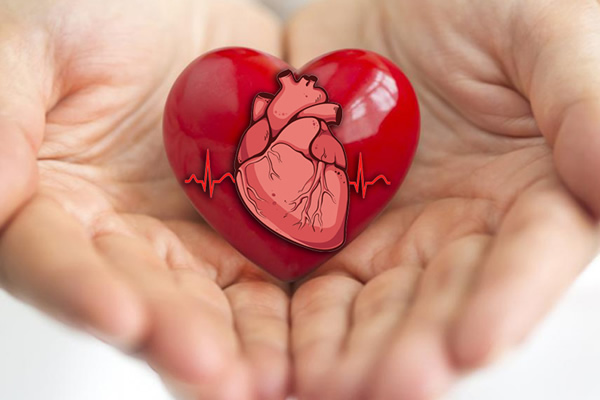
The Importance of cardiovascular health is pivotal to overall well-being, playing a crucial role in the body’s ability to function efficiently and effectively. The cardiovascular system, which includes the heart, blood vessels, and blood, is responsible for transporting oxygen, nutrients, and hormones to cells and removing waste products like carbon dioxide. Given its essential functions, maintaining cardiovascular health is vital for a long and healthy life.
This article delves into the various aspects of cardiovascular health, highlighting its importance, the factors that influence it, and practical steps for maintaining and improving it. By understanding the significance of cardiovascular health, individuals can take proactive measures to prevent diseases, enhance their quality of life, and ensure their longevity.
The Cardiovascular System: An Overview
The cardiovascular system, also known as the circulatory system, consists of the heart, blood vessels (arteries, veins, and capillaries), and blood. The heart acts as a pump, ensuring continuous blood flow throughout the body. Blood vessels serve as conduits for blood, delivering essential nutrients and oxygen to tissues and organs while removing waste products.
The Heart
The heart is a muscular organ located in the chest cavity. It has four chambers: two atria (upper chambers) and two ventricles (lower chambers). The heart’s primary function is to pump blood through two main circuits: the systemic and pulmonary circuits. The systemic circuit delivers oxygenated blood to the body’s tissues, while the pulmonary circuit carries deoxygenated blood to the lungs for oxygenation.
Blood Vessels
Blood vessels are a network of tubes that transport blood throughout the body. Arteries carry oxygen-rich blood away from the heart, while veins return oxygen-depleted blood back to the heart. Capillaries, the smallest blood vessels, facilitate the exchange of oxygen, nutrients, and waste products between blood and tissues.
Blood
Blood is a specialized fluid that circulates through the cardiovascular system. It consists of red blood cells (carrying oxygen), white blood cells (fighting infections), platelets (involved in clotting), and plasma (a liquid component containing nutrients, hormones, and waste products).
The Importance of Cardiovascular Health

The importance of cardiovascular health cannot be overstated. A healthy cardiovascular system ensures that all body tissues receive adequate oxygen and nutrients, enabling them to function optimally. Poor cardiovascular health can lead to a range of health issues, from mild fatigue to life-threatening conditions such as heart attacks and strokes.
Prevention of Cardiovascular Diseases
Cardiovascular diseases (CVDs) are a leading cause of death worldwide. These include coronary artery disease, hypertension, heart failure, and stroke. Maintaining cardiovascular health through a balanced diet, regular exercise, and avoiding risk factors like smoking can significantly reduce the risk of developing CVDs.
Enhancing Quality of Life
Good cardiovascular health enhances overall quality of life by ensuring efficient blood circulation. This supports physical activities, improves energy levels, and promotes better mental health. Individuals with healthy cardiovascular systems are less likely to experience fatigue, shortness of breath, and other symptoms associated with poor circulation.
Longevity
Numerous studies have shown a direct correlation between cardiovascular health and life expectancy. By adopting heart-healthy habits, individuals can increase their lifespan and enjoy more active and productive years. This underscores the importance of cardiovascular health in achieving longevity and vitality.
Factors Affecting Cardiovascular Health
Several factors influence cardiovascular health, some of which are controllable, while others are beyond our control. Understanding these factors can help individuals make informed choices to protect and improve their cardiovascular health.
Controllable Factors
Diet
A balanced diet rich in fruits, vegetables, whole grains, lean proteins, and healthy fats is crucial for cardiovascular health. Certain nutrients, such as omega-3 fatty acids, fiber, and antioxidants, play a significant role in maintaining heart health. Conversely, diets high in saturated fats, trans fats, and sodium can contribute to the development of cardiovascular diseases.
Physical Activity
Regular physical activity strengthens the heart, improves circulation, and helps maintain a healthy weight. The American Heart Association recommends at least 150 minutes of moderate-intensity aerobic exercise or 75 minutes of vigorous-intensity exercise per week for adults.
Smoking
Smoking is a major risk factor for cardiovascular diseases. It damages the lining of blood vessels, increases blood pressure, and reduces oxygen levels in the blood. Quitting smoking is one of the most effective ways to improve cardiovascular health.
Alcohol Consumption
Excessive alcohol consumption can lead to high blood pressure, heart failure, and other cardiovascular problems. Moderation is key; the American Heart Association suggests up to one drink per day for women and up to two drinks per day for men.
Stress Management
Chronic stress can negatively impact cardiovascular health by increasing blood pressure and leading to unhealthy coping mechanisms such as overeating or smoking. Techniques like mindfulness, meditation, and regular physical activity can help manage stress effectively.
Uncontrollable Factors
Age
As we age, the risk of cardiovascular diseases increases. This is partly due to the natural wear and tear on the heart and blood vessels over time.
Gender
Men are generally at higher risk for cardiovascular diseases at a younger age compared to women. However, the risk for women increases and can even surpass that of men after menopause.
Genetics
A family history of cardiovascular diseases can increase an individual’s risk. While genetics cannot be changed, awareness of family history can prompt proactive measures to mitigate risk.
Strategies for Maintaining Cardiovascular Health

Given the importance of cardiovascular health, it is essential to adopt strategies that promote a healthy heart and circulatory system. Here are some practical steps to maintain and improve cardiovascular health:
Healthy Eating Habits
The Mediterranean Diet
The Mediterranean diet, rich in fruits, vegetables, whole grains, fish, and olive oil, has been shown to improve cardiovascular health. It emphasizes healthy fats, lean proteins, and complex carbohydrates, which are beneficial for heart health.
Reducing Sodium Intake
High sodium intake is linked to high blood pressure, a major risk factor for cardiovascular diseases. Reducing salt in the diet by avoiding processed foods and adding herbs and spices for flavor can help maintain healthy blood pressure levels.
Incorporating Antioxidants
Foods rich in antioxidants, such as berries, dark chocolate, and nuts, help combat oxidative stress, which can damage blood vessels and contribute to cardiovascular diseases.
Regular Physical Activity
Aerobic Exercise
Activities such as walking, running, swimming, and cycling improve cardiovascular endurance and overall heart health. Aim for at least 150 minutes of moderate-intensity aerobic exercise per week.
Strength Training
Incorporating strength training exercises at least two days a week helps build muscle, reduce fat, and improve metabolism, all of which contribute to better cardiovascular health.
Flexibility and Balance Exercises
Yoga and stretching exercises enhance flexibility and balance, reduce stress, and promote relaxation, which are beneficial for cardiovascular health.
Lifestyle Modifications
Smoking Cessation
Quitting smoking can dramatically improve cardiovascular health. Resources such as nicotine replacement therapy, counseling, and support groups can aid in the process of quitting.
Limiting Alcohol Intake
Moderation in alcohol consumption is key to preventing its negative effects on the cardiovascular system. Stick to recommended guidelines to protect heart health.
Stress Reduction Techniques
Practicing stress reduction techniques such as deep breathing, meditation, and mindfulness can help manage stress levels and improve cardiovascular health.
The Role of Healthcare Providers
Healthcare providers play a crucial role in promoting cardiovascular health. Regular check-ups, screenings, and consultations with healthcare professionals can help detect and manage risk factors for cardiovascular diseases.
Regular Check-Ups
Routine check-ups allow for early detection of potential issues such as high blood pressure, high cholesterol, and diabetes, which are risk factors for cardiovascular diseases. Early intervention can prevent these conditions from progressing to more serious problems.
Screenings and Tests
Screenings for blood pressure, cholesterol levels, blood sugar, and other indicators of cardiovascular health provide valuable information for managing and reducing risk. Diagnostic tests such as electrocardiograms (ECGs) and stress tests can assess heart function and detect abnormalities.
Medication Management
For individuals with existing cardiovascular conditions or risk factors, medications may be necessary to manage blood pressure, cholesterol, and other related issues. It is important to follow prescribed treatments and maintain open communication with healthcare providers about any concerns or side effects.
The Impact of Cardiovascular Health on Mental Well-Being
The importance of cardiovascular health extends beyond physical health, significantly influencing mental well-being. A healthy heart and circulatory system contribute to better cognitive function, mood, and overall mental health.
Cognitive Function
Adequate blood flow to the brain is essential for cognitive function. Poor cardiovascular health can lead to reduced blood flow, increasing the risk of cognitive decline and conditions such as dementia and Alzheimer’s disease. Maintaining cardiovascular health through a balanced diet, regular exercise, and avoiding risk factors supports brain health and cognitive function.
Mood and Mental Health
The importance of cardiovascular health is closely linked to mood and mental health. Conditions such as depression and anxiety are more prevalent in individuals with poor cardiovascular health. Regular physical activity, a heart-healthy diet, and stress management techniques can improve mood and reduce the risk of mental health disorders.
Community and Public Health Initiatives
Community and public health initiatives play a vital role in promoting cardiovascular health on a larger scale. These initiatives focus on raising awareness, providing education, and creating environments that support heart-healthy lifestyles.
Public Awareness Campaigns
Public awareness campaigns aim to educate the public about the importance of cardiovascular health, risk factors for cardiovascular diseases, and preventive measures. These campaigns often use media, social platforms, and community events to reach a broad audience.
Education Programs
Education programs in schools, workplaces, and communities provide valuable information about heart-healthy habits, nutrition, physical activity, and the dangers of smoking and excessive alcohol consumption. By empowering individuals with knowledge, these programs promote better cardiovascular health.
Policy and Environmental Changes
Policies that promote cardiovascular health include regulations on tobacco sales, food labeling requirements, and initiatives to create walkable communities. Environmental changes, such as the availability of parks and recreational facilities, encourage physical activity and support cardiovascular health.
Conclusion
The importance of cardiovascular health is undeniable. A healthy cardiovascular system is essential for overall well-being, affecting everything from physical health to mental and emotional well-being. By understanding the factors that influence cardiovascular health and adopting heart-healthy habits, individuals can reduce their risk of cardiovascular diseases, enhance their quality of life, and enjoy a longer, healthier life.
Healthcare providers, community initiatives, and public health policies all play a crucial role in promoting cardiovascular health. Through a combination of individual efforts and collective action, we can improve cardiovascular health outcomes and ensure a healthier future for all. Remember, the journey to better cardiovascular health begins with small, consistent steps and a commitment to making heart-healthy choices every day.






